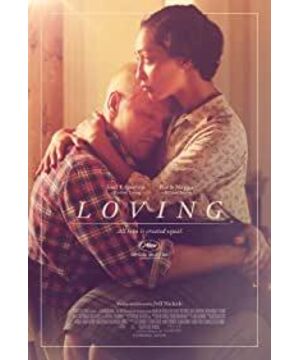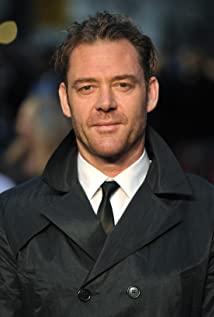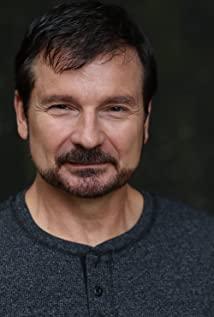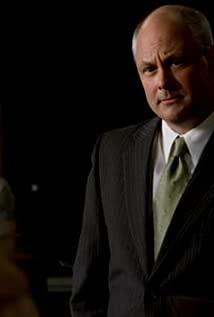In "Milk", the passionate and politically shrewd politician, the strong deterrent force of his speech in the crowd, aroused the collective consciousness of the homosexual minority, and even made people look at it. Tears poured down like rain, which can be said to be very provocative. The film itself is also good, and Harvey Milk himself is an icon of gay civil rights activism.
But let's think about it, are there some people who are just civilians who don't even know how to fight?
This is the charm of the theme chosen by "Love". We have seen politicians incite the crowd to shout their slogans, and we are also used to seeing the resistance of small people. These are the usual Oscar selection rules. But "Love" is different. After watching it for half an hour, I was already convinced that this film could not win anything at the Oscars. Although it is based on true events, it is still a story about the prohibition of black and white intermarriage, but it destined to be ignored. To be honest, I don't like the domestic translation of the title "Love" at all. First of all, it collided with the title of a third-level French movie. In addition, it is also a mediocre and easily misunderstood title. Translated into "In the name of love" would be much better.
There is a strong connection between "Love" and "Milk". They both tell stories about a minority fighting for the rights they deserve. But how to say it, it can be said that the benevolent sees benevolence, and the wise sees wisdom. But the most common way is to make the story compelling, and the easiest and easiest way to get there is to create conflict.
The story of "Love" focuses on the unfair ruling of black and white marriages, and then the couple relying on the law to reclaim their rights. It can be said that the story itself has too many dramatic points. For example, the couple was abused by the police, discriminated against by the crowd, and then gave an impassioned speech on the way to the fight. But director and screenwriter Jeff Nicholson said no to all of this. The foothold he found for the movie, which everyone would laugh at, was "love."
How does the director talk about love? Jeff Nichols chose to be real. At the beginning of the movie, when Richard was about to marry her, did everyone hit the ground like a thunderbolt, and then the family jumped on the table and started to fight? No, just a little surprised, as if to say with uncertainty, is this all right? Only Richard's black brother complained a few words: It's fine without a wife. This happened to be a very true depiction of the people in the countryside at that time. They did not understand the law, they were bound by the established rules, and then they were ignorant and suspicious of those who broke the rules. This is also a reflection of the imperfect law.
In an easily overlooked moment in the film, the photographer for Life magazine, played by Michael Shannon, arrives at the Loewens' home. He came to do publicity on the couple's journey to fight for their rights. He watched them eat together, wash dishes together, watch TV together, eat snacks together, and then silently took pictures one by one. There was no soundtrack, and the husband and wife were peaceful and harmonious. Surprisingly, these very daily life are so beautiful in the photos, and the life of the two is very beautiful. The beauty of everyday life that can be achieved without being contrived gives people a spiritual earthquake in a quiet environment. They love each other deeply, and that's enough.
Although this is a story that focuses on fighting for rights, the description of the couple is also very delicate, and the performances of both of them in the movie are drawn inwards, so it is not easy to make people so impressed. When Mildred and Richard (the Rowans in the film) first meet the lawyer, the wife is the initiator, and she is proactive when she talks to the lawyer, but there is a hesitation on her face that doesn't understand the law. And her husband Richard left a very deep impression in this scene. From time to time he wandered his eyes and bowed his head. When the lawyer said that he could sue to the Supreme Court, he was afraid, and he said anxiously, can we talk to the judge privately, as long as we can go back, we will not cause trouble.
It sounds depressing, but it is very true. A car mechanic, without knowledge and culture, and taciturn, has swallowed his breath for so many years, how can he think that he is working hard for the amendment of the Constitution of the entire United States? He only thinks about making big things small and small things, so what else can he think of? So, the couple in the movie is very vivid, and the director gave them an unadorned, three-dimensional image. But what actually surprised me the most was that they didn't change because of their participation in this struggle. In the film, there are only a few reporters, no parades, no speeches, and the film is not provocative at all. Even when the pictures taken by the photographer before were posted in the newspaper, Richard was still a little dissatisfied. These wonderful moments should only be kept in the heart, not consumed.
During the Supreme Court hearing, the couple did not even go to the scene. Even if they have the power to sit with the Supreme Court justices, they still choose to bring children and mow the lawn. When the moment of victory came, he was repairing the car and she was picking up clothes, without feeling like a hero at all.
Many years later, Mildred recalled his deceased husband and said only one sentence:
"I miss him, he took good care of
me ." I don't think the best screenwriter in the world could make this sentence. People are moved because it comes from life, and from the ordinary love in life, which is the most moving.
View more about Loving reviews











